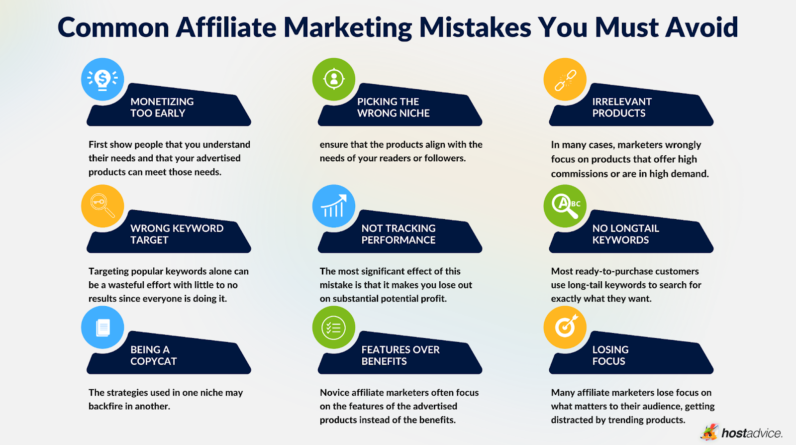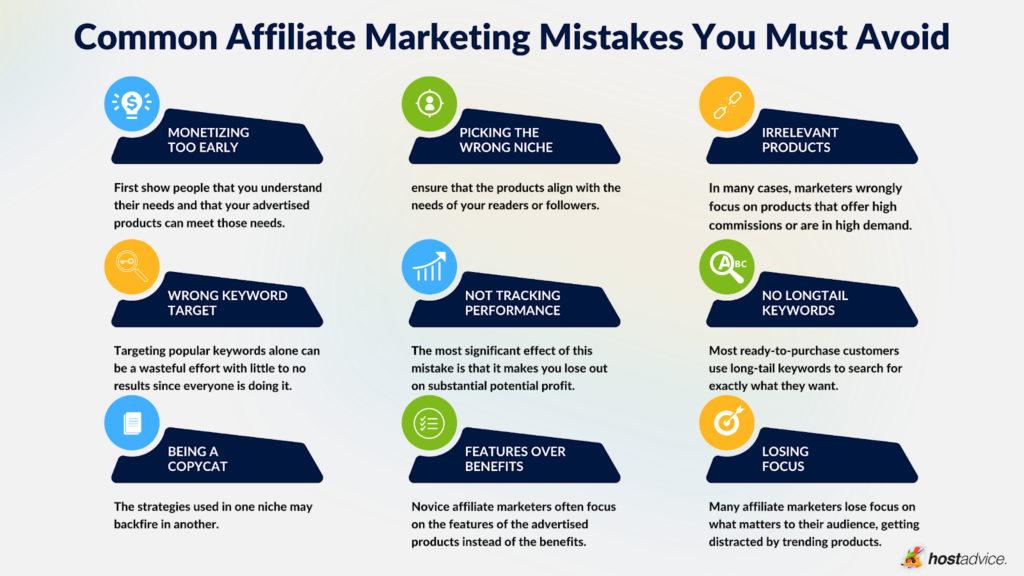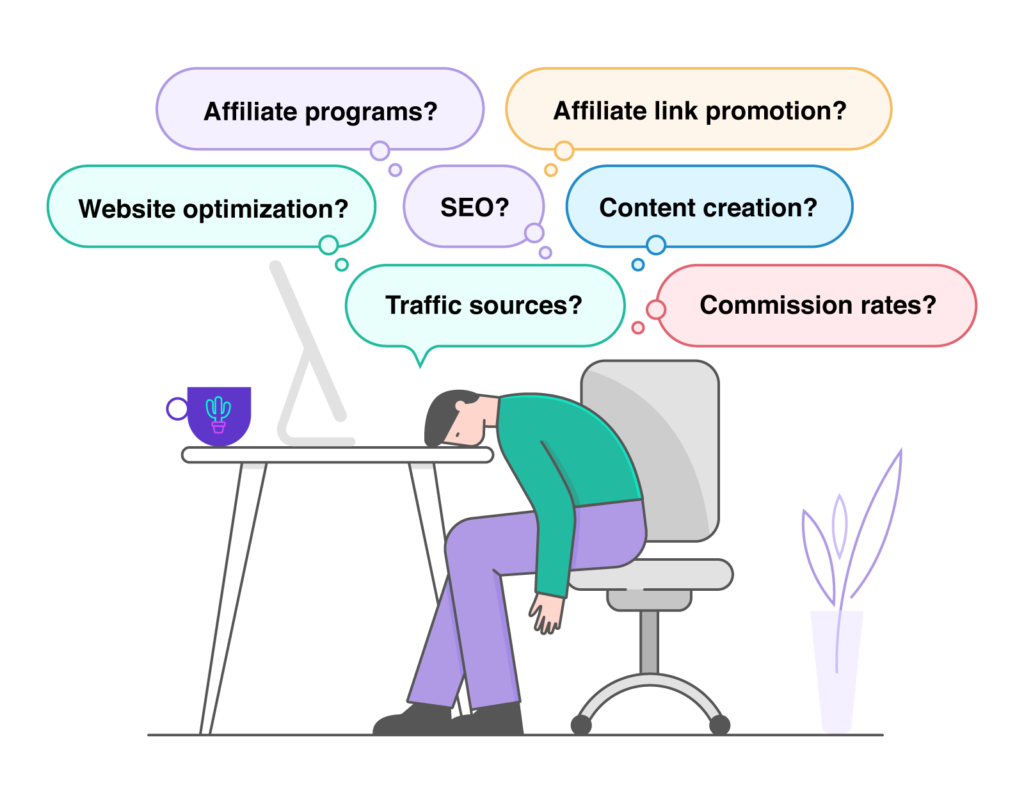
Affiliate marketing can be a lucrative venture, but it’s important to navigate it carefully. In this article, you will discover the most common mistakes made in affiliate marketing and how to avoid them. Whether you’re a seasoned marketer or just starting out, these tips will help you maximize your earnings and build a successful affiliate marketing business. So, let’s dive in and ensure you steer clear of these common pitfalls!

Choosing the wrong niche
Not conducting proper research
When it comes to affiliate marketing, choosing the right niche is crucial for your success. One common mistake many affiliate marketers make is not conducting proper research before selecting a niche. It’s important to thoroughly analyze different niches and understand their potential for profitability. By researching market trends, competition, and audience demand, you can make an informed decision and avoid wasting time and effort on a niche that may not be lucrative.
Ignoring personal interests and expertise
While it’s important to choose a profitable niche, it’s equally important to consider your own interests and expertise. Ignoring personal interests and expertise can lead to a lack of motivation and engagement in your affiliate marketing efforts. When you choose a niche that aligns with your passions and knowledge, you’ll be more likely to create high-quality content, connect with your audience, and establish yourself as an authority in your chosen niche.
Picking an oversaturated market
Another mistake many affiliate marketers make is selecting an oversaturated market. While it may seem attractive to choose a popular niche with a large audience, the competition can be fierce, making it difficult to stand out and gain traction. It’s important to strike a balance between a niche with enough demand and competition that you can effectively compete in. By choosing a niche with a targeted audience and less competition, you’ll have a better chance of success in the affiliate marketing world.
Not building a strong brand
Lack of consistency in branding
Building a strong brand is essential for long-term success in affiliate marketing. However, one common mistake is a lack of consistency in branding. Your brand should have a clear and consistent message across all your marketing channels, including your website, social media platforms, and promotional materials. Inconsistent branding can confuse your audience and make it difficult for them to connect with your brand.
Neglecting content quality
Another mistake affiliate marketers make is neglecting content quality. Your content is a reflection of your brand, expertise, and the value you provide to your audience. Poorly written or subpar content can deter potential customers and damage your credibility as an affiliate marketer. By focusing on creating high-quality, informative, and engaging content, you can build trust with your audience and increase your chances of driving conversions.
Ignorance towards target audience’s needs
Understanding and catering to your target audience’s needs is key to affiliate marketing success. However, many affiliate marketers make the mistake of ignoring their target audience’s needs. It’s important to conduct thorough research to understand your audience’s pain points, preferences, and interests. By tailoring your content and promotions to address their specific needs, you’ll be far more likely to attract and retain loyal customers.
Failing to build an email list
Underestimating the power of email marketing
One of the biggest mistakes affiliate marketers make is underestimating the power of email marketing. Building an email list allows you to communicate directly with your audience and establish a deeper connection. By creating valuable and relevant content in your email newsletters, you can build trust, promote your affiliate products, and drive conversions. Neglecting to build an email list means missing out on a valuable opportunity to engage with your audience and increase your affiliate revenue.
Not providing value to subscribers
Another mistake affiliate marketers make is not providing value to their email subscribers. Simply bombarding your subscribers with promotional emails without offering valuable content can lead to a high unsubscribe rate and a decrease in conversions. Instead, focus on delivering content that educates, informs, and entertains your subscribers. By providing value, you’ll build a stronger relationship with your audience and increase the likelihood of them purchasing products through your affiliate links.
Neglecting list-building strategies
Building an email list requires consistent effort and an understanding of effective list-building strategies. Unfortunately, many affiliate marketers neglect this aspect of their business. Whether it’s offering compelling lead magnets, optimizing opt-in forms, or leveraging social media to promote your email list, implementing effective list-building strategies is essential for sustained growth in affiliate marketing. Don’t overlook the importance of building and nurturing your email list as it can be a valuable asset for your affiliate business.
Promoting too many products
Losing credibility through excessive promotion
Promoting too many products is a common mistake that can quickly erode your credibility as an affiliate marketer. When you promote a wide range of products without a clear focus, it can give the impression that you’re only interested in making a quick profit, rather than genuinely recommending valuable products to your audience. By narrowing down your product selections and focusing on those that align with your niche and provide real value, you’ll maintain your credibility and build trust with your audience.
Lack of focus on promoting quality products
In the pursuit of earning affiliate commissions, many affiliate marketers make the mistake of promoting low-quality or irrelevant products. Reputation is critical in affiliate marketing, and promoting subpar products can lead to negative customer experiences and damage your brand’s reputation. It’s essential to thoroughly evaluate the quality and relevance of the products you promote to ensure they meet the needs and expectations of your audience. By focusing on quality, you’ll build a stronger relationship with your audience and increase your chances of driving conversions.
Neglecting to connect products with target audience’s interests
Connecting the products you promote with your target audience’s interests is vital for affiliate marketing success. However, many affiliate marketers overlook this aspect and fail to align their product recommendations with their audience’s preferences and needs. By understanding your audience’s pain points, preferences, and aspirations, you can choose products that truly resonate with them. By making these connections and promoting products that genuinely solve their problems or fulfill their desires, you’ll have a higher chance of converting your audience into buyers.

Not utilizing SEO effectively
Ignoring keyword research
Search engine optimization (SEO) is crucial for driving organic traffic to your affiliate website. Yet, many affiliate marketers make the mistake of ignoring keyword research. By conducting thorough keyword research, you can identify high-demand, low-competition keywords that can help your website rank higher in search engine results. Neglecting this research can result in missed opportunities to attract targeted traffic and ultimately drive more conversions to your affiliate products.
Neglecting on-page optimization techniques
In addition to keyword research, neglecting on-page optimization techniques can hamper your website’s performance in search engine rankings. On-page optimization encompasses elements such as optimizing page titles, meta descriptions, headers, and URL structures. By optimizing these elements to include relevant keywords and improve user experience, you’ll make it easier for search engines to understand and rank your content. Ignoring these on-page optimization techniques can lead to your content being overlooked by search engines and thus, fewer visitors to your affiliate website.
Underestimating the importance of backlinks
Backlinks play a vital role in SEO and are often overlooked by affiliate marketers. Backlinks are links from other websites to your own, and search engines consider them as indicators of your website’s authority and credibility. By building high-quality backlinks from reputable websites in your niche, you can improve your website’s visibility and rankings in search engine results. Neglecting to prioritize backlink building can prevent your website from gaining the authority needed to attract organic traffic and maximize your affiliate marketing efforts.
Disregarding affiliate program policies
Misinterpreting terms and conditions
Different affiliate programs have their own unique terms and conditions that affiliate marketers must abide by. Unfortunately, many affiliate marketers make the mistake of misinterpreting these policies and unintentionally violating them. It’s crucial to thoroughly read and understand the terms and conditions of each affiliate program you join to ensure compliance. Misinterpreting these policies can result in penalties, account suspension, or even termination from the affiliate program.
Engaging in prohibited promotional methods
Affiliate marketing programs often have specific guidelines on permitted promotional methods. However, some affiliate marketers disregard these guidelines and engage in prohibited promotional methods. These could include spamming, using deceptive practices, or utilizing unauthorized advertising channels. It’s essential to familiarize yourself with the affiliate program’s guidelines and comply with their rules to maintain a healthy and long-term relationship with the program and its advertisers.
Neglecting disclosure requirements
Another common mistake made by affiliate marketers is neglecting to disclose their affiliate relationships when promoting products or services. Ethical affiliate marketing requires transparency and honesty with your audience. Failure to disclose your affiliate relationships can undermine trust with your audience and may even result in legal consequences. Always ensure you clearly disclose your affiliate relationships whenever you recommend or promote affiliate products to maintain transparency and trustworthiness.

Failing to analyze and optimize campaigns
Lack of tracking and monitoring tools
Analyzing and optimizing your affiliate marketing campaigns is crucial for continued growth and success. However, many affiliate marketers make the mistake of neglecting tracking and monitoring tools. Without proper analytics in place, it becomes challenging to assess the performance of your campaigns, identify areas for improvement, and make data-driven decisions. Investing in tracking and monitoring tools will provide valuable insights into your campaigns’ effectiveness and help you optimize your strategies for better results.
Neglecting split-testing and conversion optimization
Split-testing, also known as A/B testing, is a powerful strategy to optimize your affiliate marketing campaigns. Unfortunately, many affiliate marketers overlook the importance of split-testing and fail to perform rigorous testing to improve their conversion rates. By testing different elements such as headlines, call-to-action buttons, and layout variations, you can identify the most effective approaches to driving conversions. Neglecting this crucial step can result in missed opportunities to enhance your campaign’s performance and maximize your affiliate income.
Not adapting to market trends and consumer behavior
The affiliate marketing landscape is constantly evolving, with new trends and consumer behavior emerging regularly. Failing to adapt to these market trends and consumer behavior is a common mistake made by affiliate marketers. It’s essential to keep a pulse on your target audience’s preferences, industry trends, and changes in consumer behavior. By staying informed and adjusting your strategies accordingly, you’ll be able to meet the evolving needs of your audience and maintain a competitive edge in the affiliate marketing space.
Overlooking the importance of affiliate relationships
Not building strong relationships with affiliate managers
Building strong relationships with affiliate managers can greatly benefit your affiliate marketing business. However, many affiliate marketers overlook the importance of cultivating these relationships. Affiliate managers can provide valuable insights, exclusive promotions, and enhanced support for your campaigns. By actively engaging with your affiliate managers, seeking advice, and establishing a rapport, you’ll be more likely to receive special treatment and opportunities that can boost your affiliate performance.
Neglecting to communicate and negotiate for better deals
Communication plays a vital role in affiliate marketing success, yet many affiliate marketers neglect to communicate with their affiliate partners. By actively engaging in conversation, providing feedback, and negotiating better deals, you can foster stronger affiliate relationships and improve your earning potential. Don’t be afraid to reach out, share your ideas, and build mutually beneficial partnerships with your affiliate partners.
Ignoring network and community involvement
Affiliate marketing networks and communities offer valuable resources, support, and networking opportunities for affiliate marketers. Unfortunately, many affiliates overlook the importance of network and community involvement. By actively participating in these networks and communities, you can stay updated on industry news, learn from experienced affiliates, and gain exposure to potential collaborations and partnerships. Neglecting this aspect can limit your growth potential and miss out on valuable connections.

Ignoring the importance of customer trust
Promoting unreliable or low-quality products
Building trust with your audience is crucial for affiliate marketing success. One mistake many affiliate marketers make is promoting unreliable or low-quality products. When you recommend products that fail to meet your audience’s expectations, it can lead to disappointment, a loss of trust, and potentially harm your reputation as an affiliate marketer. It’s essential to thoroughly vet the products you promote and only recommend those that you truly believe in and trust.
Lack of transparency in promotions and recommendations
Transparency and honesty are fundamental in affiliate marketing. Unfortunately, some affiliate marketers make the mistake of lacking transparency in their promotions and recommendations. Whether it’s by omitting relevant information or exaggerating the benefits of a product, failing to be transparent can lead to a loss of trust and credibility with your audience. Always provide honest and accurate information about the products you promote to maintain the trust of your audience.
Not addressing customer concerns and feedback
Listening to your audience and addressing their concerns and feedback is vital for maintaining strong customer trust. However, many affiliate marketers make the mistake of disregarding customer concerns and feedback. By actively responding to queries, addressing complaints, and incorporating feedback into your strategies, you can show your audience that their opinions matter and that you genuinely care about their satisfaction. Failing to address customer concerns and feedback can damage your reputation and hinder your long-term success.
What are Some Common Mistakes to Avoid When Monetizing with Affiliate Marketing?
When it comes to strategies to monetize affiliate marketing, there are a few common mistakes that should be avoided. Firstly, overlooking the importance of choosing the right niche can greatly hinder your success. Additionally, relying solely on one affiliate program without diversifying can limit your earnings potential. Moreover, neglecting to build a strong rapport with your audience can lead to low conversion rates. Lastly, failing to track and analyze data can prevent you from optimizing your campaigns for better returns.
What Are Some High-Paying Niches in Affiliate Marketing That I Should Focus On?
Looking to make big bucks in affiliate marketing? Look no further than high-paying affiliate marketing niches. With the potential to earn large commissions, niches like finance and luxury goods attract high-value customers. Health and wellness, technology, and online education are also lucrative options. By focusing your efforts on these niches, you can maximize your income and reap the rewards of your hard work.
Failing to diversify income streams
Relying solely on one affiliate program or platform
Affiliate marketers often make the mistake of relying solely on one affiliate program or platform for their income. While it may seem convenient, it puts your business at risk if that program or platform experiences any issues or changes its policies. Diversifying your income streams by partnering with multiple affiliate programs or platforms can provide stability and ensure that your earnings are not solely dependent on one source.
Not exploring additional monetization methods
Affiliate marketing is just one of many monetization methods available to content creators. Yet, many affiliate marketers fail to explore additional opportunities to diversify their income. Consider other monetization methods such as sponsored content, advertising, or creating and selling your own products or services. By exploring these additional income streams, you can maximize your earning potential and create a more sustainable affiliate marketing business.
Neglecting to create different revenue streams
Similar to relying on one affiliate program or platform, neglecting to create different revenue streams is another common mistake made by affiliate marketers. By putting all your eggs in one basket, you leave yourself vulnerable to sudden changes or disruptions in the industry. Diversify your revenue streams by exploring different affiliate programs, platforms, or even branching out into other business ventures. This way, you’ll not only safeguard your income but also open up new opportunities for growth.
By avoiding these common affiliate marketing mistakes, you can set yourself on the path to success. Remember to choose the right niche, build a strong brand, prioritize building an email list, promote products strategically, utilize SEO effectively, adhere to affiliate program policies, analyze and optimize your campaigns, nurture affiliate relationships, prioritize customer trust, and diversify your income streams. By keeping these factors in mind, you’ll be well on your way to becoming a successful affiliate marketer.








